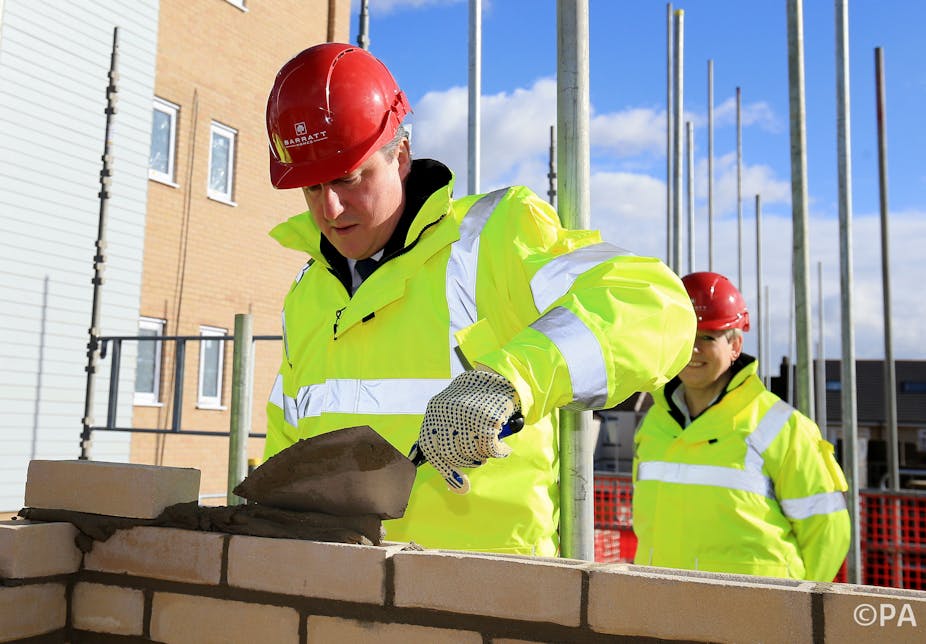At the Conservative Party manifesto launch, David Cameron declared that “the dream of a ‘property-owning democracy’ is alive and well”, while outlining plans to return to one of the most successful aspects of Margaret Thatcher’s political agenda by extending the right-to-buy to families who are currently housing association tenants.
In comparison to many European neighbours, the politics of property ownership loom especially large in the UK, and Cameron clearly hopes that his proposals will forge a connection to a deep aspiration shared by many. In practice the policy would amount to an assault on housing associations. In effect they would be forced against their will to sell off parts of their housing stock at below-market levels. This raises questions both as to its fairness and even to its legality under human rights law.
To enact policies that are so unpopular with not-for-profit housing associations might seem a curious move for a party that professes to want to support a vibrant ecosystem of secondary associations and organisations that can constitute “the big society”. But setting this issue aside, is Cameron onto a winner, given the special place of home ownership in the British political psyche?
Security, freedom and independence
In launching the manifesto, Cameron put the central motivating idea behind the proposal like this:
Part of having a good life is having a home of your own, it’s not about assets and appreciating values it is about someone standing here with the keys in their hand thinking this place is mine.
That seems an oddly uninformative way of describing the policy’s supposed attractiveness. A deeper account is offered in the work of James Meade, the Nobel Prize-winning British economist, and perhaps the leading theorist of the idea of a property-owning democracy.
In his 1964 book Efficiency, Equality and the Ownership of Property – a text that has been influential on thinkers as diverse as the political philosopher John Rawls and the economists Anthony Atkinson and Thomas Piketty – Meade had this to say about the attractions of property ownership:
A man with much property has great bargaining strength and a great sense of security, independence and freedom; and he enjoys these things not only vis-à-vis his propertyless fellow citizens but also vis-à-vis the public authorities.
This gets to the heart of the attraction. Beyond the simple acquisitive desire to be able to say (as Cameron has it) that something is mine, what drives the attraction of property ownership is its capacity to bring a sense of freedom and security. It’s about not being under the power of others, and having the sense that one can stand securely on one’s own feet.
Tackling inequality
While Cameron might agree with this aspect of Meade’s work, he’d feel distinctively less comfortable if he were to follow the idea of a property-owning democracy to its natural conclusion. For Meade, it was precisely because of the importance of property in creating the conditions for individual security, independence and freedom that we should be so concerned about large inequalities of property ownership. As Meade put it:
An unequal distribution of property means an unequal distribution of power and status even if it is prevented from causing too unequal a distribution of income.
Meade therefore argued that if we really want to create a property-owning democracy, efforts must be made to include all citizens. This cannot be achieved only by providing a way only for a relatively small number of additional people to join the ranks of residential property owners – as with the current Conservative proposals. Instead, it would involve the redistribution of property away from the wealthiest members of society.
Taking the idea of a property-owning democracy seriously would, as Meade argued, involve finding ways to break up the largest agglomerations of property. Ownership needs to be spread of a variety of forms of wealth and capital across the economy. This would mean greater taxation of housing and capital (as with the “Mansion Tax” proposals favoured by the Labour Party), with particular attention paid to the taxation of capital transfers through gift or inheritance.
Opportunity for all
It would also involve finding other ways to give every citizen, no matter how humble their start in life, ownership of at least some useful wealth. Yet the Conservatives propose to reduce rather than to increase inheritance tax, they oppose the Mansion Tax, and almost the first thing that the Coalition government did was to scrap the Child Trust Fund or “baby bond”, which gave a modest but significant pot of money to every child in the country.
David Cameron says he favours a property-owning democracy, but Conservative policies are more redolent of a plutocracy. If we want to take the idea more seriously than Cameron has done, then we cannot lose track of Meade’s insight that it is precisely because property ownership can make such a difference to people’s lives that a just society is one that extends this concern to all – and not just to some.

